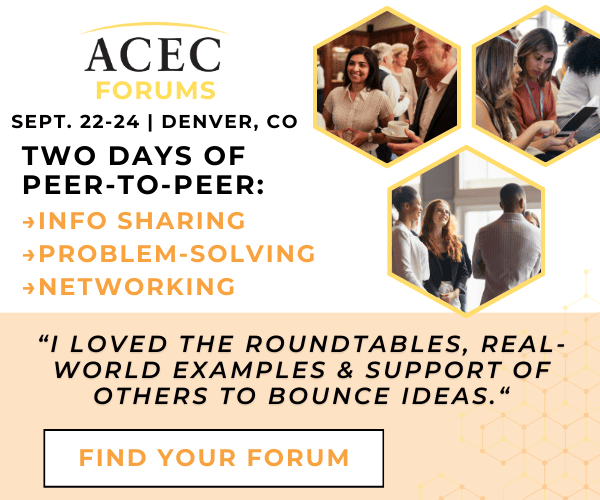Over the last few years, many have gone from thinking about software as the exclusive domain of developers to now having the low-code software and AI capabilities to develop applications with little to no need for writing code.
Power Platform, a partner presentation host at the Fall Conference, is a low-code, AI-driven integration engine and ecosystem of software tools. It provides a centralized data hub for the applications that engineering firms rely on most and positions firms for seamless technological adoption to boost their competitive edge.
According to session presenters, Venkat Rao, vice president of Power Platform, and Business Development Director Drew Cooke of HSO, firms that embrace new technology such as “drop-and-drag” software development are significantly reducing lead times and boosting efficiency. The data backs this up.
Recent survey results reveal that 89 percent of CIOs and IT professionals report that low code has increased efficiency, while another 87 percent of them say these technologies allow them to better harness the full set of their capabilities and 86 percent note they help generate more accurate data insights.
The benefits were highlighted by three use cases involving low-code and AI on Power Platform. The first showcased how administration or HR questions can be answered faster with AI-driven virtual assistants. The case involved a 1000+ Dallas traffic design standards document and demonstrated how the tool enabled users to search and understand documents faster.
The second case pertained to quality assurance demonstrating how the Power APP can easily be customized to meet the user’s unique needs, such as site surveys, with broad categories of controls and streamlined workflows.
Finally, by feeding the application photos, the software’s AI capabilities can quickly identify equipment and digitize handwritten notes, removing the need to manually type things out. This last use case touched on the internal resistance firms sometimes face when working to adopt new technologies.
To this point, Rao expressed that Power Platform doesn’t want customers to “simply get rid of what they have, especially if they’re already very comfortable with it” such as a field engineer sticking to handwritten notes.
While firms generally understand the need to implement new technologies on a large scale, it can and usually does begin with smaller, more gradual changes. In the early stages of modernization, Rao explained that “as long as someone takes ownership to get started and see where it goes,” the firm will be on a trajectory for the broad implementation of more enriching user experiences.


